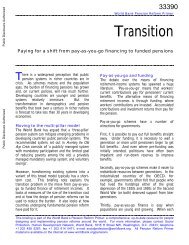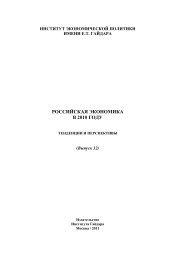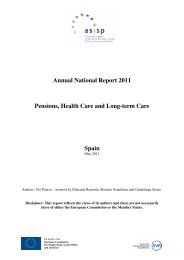Financial Sector Development in Africa: Opportunities ... - World Bank
Financial Sector Development in Africa: Opportunities ... - World Bank
Financial Sector Development in Africa: Opportunities ... - World Bank
You also want an ePaper? Increase the reach of your titles
YUMPU automatically turns print PDFs into web optimized ePapers that Google loves.
The Potential of Pro-Market Activism for F<strong>in</strong>ance <strong>in</strong> <strong>Africa</strong>: A Political Economy Perspective 221<br />
also draws policy implications for those countries currently not likely to<br />
have good enough governance to successfully pursue activist policies.<br />
The exist<strong>in</strong>g literature on the political economy of f<strong>in</strong>ance suggests<br />
that the assumption of <strong>in</strong>terdependencies between private and public<br />
agents should frame the political economy analysis. Exist<strong>in</strong>g work also<br />
shows the value of an approach that seeks to expla<strong>in</strong> or predict f<strong>in</strong>ancial<br />
policy choices through the analysis of coalitions of <strong>in</strong>terests between<br />
private and public agents. In this way, the nature of a particular policy<br />
coalition and its power to determ<strong>in</strong>e f<strong>in</strong>ancial policies seems to be particularly<br />
shaped by the historically produced organization of the private<br />
bank<strong>in</strong>g sector <strong>in</strong> relation to the state, and the revenue base of the state.<br />
If the political economy analysis suggests that the political conditions<br />
are favorable, there are conv<strong>in</strong>c<strong>in</strong>g arguments for support<strong>in</strong>g welldesigned<br />
activist policies such as subsidies or tax <strong>in</strong>centives as temporary<br />
devices to complement modernist approaches. More often than not,<br />
however, the political environment is likely to be unfavorable, so governments<br />
must pursue strategies other than activism to encourage economic<br />
development. Political economy suggests two ma<strong>in</strong> strategies for advisors<br />
and policy makers <strong>in</strong> countries with an unfavorable environment. One<br />
possibility is to try to change the power relationships with<strong>in</strong> society, for<br />
<strong>in</strong>stance, through encourag<strong>in</strong>g political entrepreneurship to empower<br />
f<strong>in</strong>ancially excluded groups. The alternative possibility is to work with<strong>in</strong><br />
the political environment and, for example, improve the function<strong>in</strong>g of<br />
second-best <strong>in</strong>stitutions, such as relationship-lend<strong>in</strong>g.<br />
These arguments entail a new approach for mak<strong>in</strong>g decisions about<br />
spend<strong>in</strong>g resources to build <strong>in</strong>clusive f<strong>in</strong>ancial systems by emphasiz<strong>in</strong>g<br />
the need to focus on what drives development and what is politically<br />
feasible. Tak<strong>in</strong>g such a pragmatic, but maybe more realistic, approach<br />
requires greater openness to second-best policies. While globally deemed<br />
first-best solutions such as property rights and efficient courts are crucial<br />
for f<strong>in</strong>ancial development, they might be difficult and slow to establish <strong>in</strong><br />
countries with an unfavorable political environment. In such countries a<br />
focus on the low-hang<strong>in</strong>g fruit, such as foster<strong>in</strong>g relationship-lend<strong>in</strong>g<br />
schemes or social entrepreneurship, might offer limited progress, but also<br />
a more promis<strong>in</strong>g way forward. In addition, through their effect on the<br />
political environment, second-best policies could <strong>in</strong>crease the demand for<br />
first-best policies <strong>in</strong> the longer term.<br />
Translat<strong>in</strong>g both implications—to revise f<strong>in</strong>ancial reform strategies <strong>in</strong><br />
accordance with the results of political economy analysis and also to be<br />
open to time-bound second-best (<strong>in</strong>clud<strong>in</strong>g activist) solutions—<strong>in</strong>to







